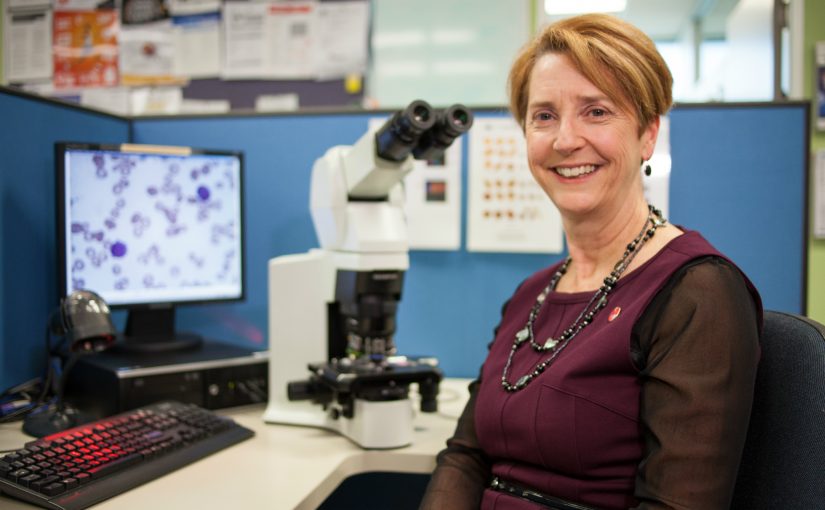Pathologist Ellen Maxwell reflects on a week in haematology.
Last week on call started with simultaneously juggling two young male patients with severe anaemia from autoimmune haemolysis.
This is a condition where antibodies produced by the person’s body attack their own red blood cells and cause them to burst. This means that red blood cells that usually last in the bloodstream for 100-120 days have a shorter lifespan, sometimes only a few days. Low red blood cell count (anaemia) is serious and can cause symptoms including tiredness and breathlessness, and in severe cases could be fatal.
Severe anaemia can be treated with a blood transfusion.
‘Both patients were first presentations at Accident and Emergency Departments in separate regional and metropolitan hospitals. The first had such strong antibodies that it was proving difficult even for our established blood bank scientists to analyse the patient’s blood and find an accurate match.
Meanwhile the hospital staff needed to know what to do next, as they were not allowed to transport any patient with severe anaemia to the ward without available blood, and did not want to hear that it may take hours’.
Finding an accurate match for a blood transfusion is essential as providing the wrong blood could cause serious illness and even death.
‘Patient number 2 had an almost identical presentation and was going to be transferred to a public hospital but when it came to the crunch, no bed was available. Meanwhile, to expedite his care, his specimens were sent to his intended destination, so they could process and provide blood on his arrival.
We were then in the difficult scenario of having to provide blood support in our hospital without the benefit of our own investigations, but working in concert with scientists across 2 organisations in the late hours of the evening’.
The next challenge was a major post-partum (after birth) haemorrhage in a Jehovah’s witness at 5:30 am.
Blood transfusions are thought to go against the teachings of the Jehovah’s Witness religion, and most patients of this faith will refuse them.
‘This is a challenging scenario physically, technically and emotionally for all staff involved. Respecting the individual’s choice to potentially die only 24 hours after delivery of a live, healthy infant is so hard for family and staff, those there with her physically in theatre and those with her emotionally in the lab.
Then came notification of a patient, with total knee surgery underway, whose simple group and screen request provided by the anaesthetist was far from simple. A pan reacting antibody raised alarm bells.’
Patients having surgery will have blood samples sent to the lab for blood typing in case of complications in surgery that mean the patient would require blood. The cross matching process is designed to find blood that mirrors the patient’s own and so will not be rejected by their body. A ‘pan reacting antibody’ is a protein that shows multiple reactions making it difficult to find a match.
‘Quick thinking from the local scientist led to interrogation of the Blood Service records to reveal the patient had been tested through another laboratory earlier in the week and had an antibody to a common antigen: one that would be present and potentially reactive in every red cell unit we selected for the patient. In short, we had no compatible blood.
Despite the low likelihood of transfusion in this surgical scenario of a total knee replacement, judicious management of the patient, care and carefully planning for potential unexpected outcomes are mandatory in this circumstance.
To top it off I was asked on Friday afternoon to provide technical advice to a medical support team overseas, imminently expecting civilian casualties, but hamstrung by the delayed arrival of blood banking equipment and staff to perform vital cross matching procedures. There’s a question I’ve never had to field before!
So, this week was a real mix of dramatic scenarios and diagnoses, and made me consider what expertise we offer when life and results are not straightforward. This week my worth was valued in units of sage advice not units of red cells; in fact, I’ve never worked so hard to not give blood in my career to date’.

